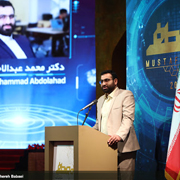Speakers

Mohammad Abdolahad
Place of Birth : Iranian
Position : Associate Professor at Tehran University of Medical Sciences, Iran
Field of study : Nanobioelectronic, Cancer nanotechnology
H. Index : 18
Dr. Abdolahad received his PhD. in Nanoelectronic Engineering from the University of Tehran in 2013 and immediately joined the university as a faculty member in the school of electrical and computer engineering. He published 49 papers and 14 USA Patents in the field of cancer detection by nanoelectronic devices. He introduced CNT-ECIS, SiNW-ECIS, NELMEC, Metas-Chip, and cancer diagnosis probe (CDP) as new miniaturized systems for cancer diagnosis.
His team has developed a biosensor that can detect cancer through speedy tracking of the tumor cells and with high accuracy. This biosensor is cost-effective, fast, and highly accurate. The system, called ‘Metastatic Cancer Detection Biosensor’, was developed using nanotechnology and belongs to the 10th generation of cancer detection sensors. The sensor has successfully completed the lab trials and is now in the clinical trial phase. It is being tested to check breast, prostate, and lymph nodes cancers among others and has been patented in Iran and the US.
The team, led by professors Mohammad Abdolahad, Morteza Mahmoudi, and Shams Mohajerzadeh have demonstrated a nanoelectromechanical procedure to relate the correlation between the mechanical stimulation of a cell's actin filaments and the electrical activities of ion channels to the cancerous state of the cell. This is a novel modality in single-cell, label-free cancer grading based on the electrical signal recording by silicon nanotube probes from mechanically aspirated normal and cancer cells by electrically activated borosilicate micropipette. The results have opened a new window in the field of cancer nano-electromechanics sensing and some hidden relations between cells organelles with mechanical and electrical roles in cancerous transformation. The researchers note that potential future applications of this novel device could include assessing the effect of drugs on the mechanical and electrical properties of different cells or monitoring the electromechanical properties of stem cells during the differentiation process. His team has developed a nano-electronic chip that for the very first time in the world can detect and distinguish circulating tumor cells in the bloodstream without any need for a biological indicator. The NELMEC chip analyzes the blood sample and counts the number of circulating tumor cells (CTC) in people’s bloodstream.



